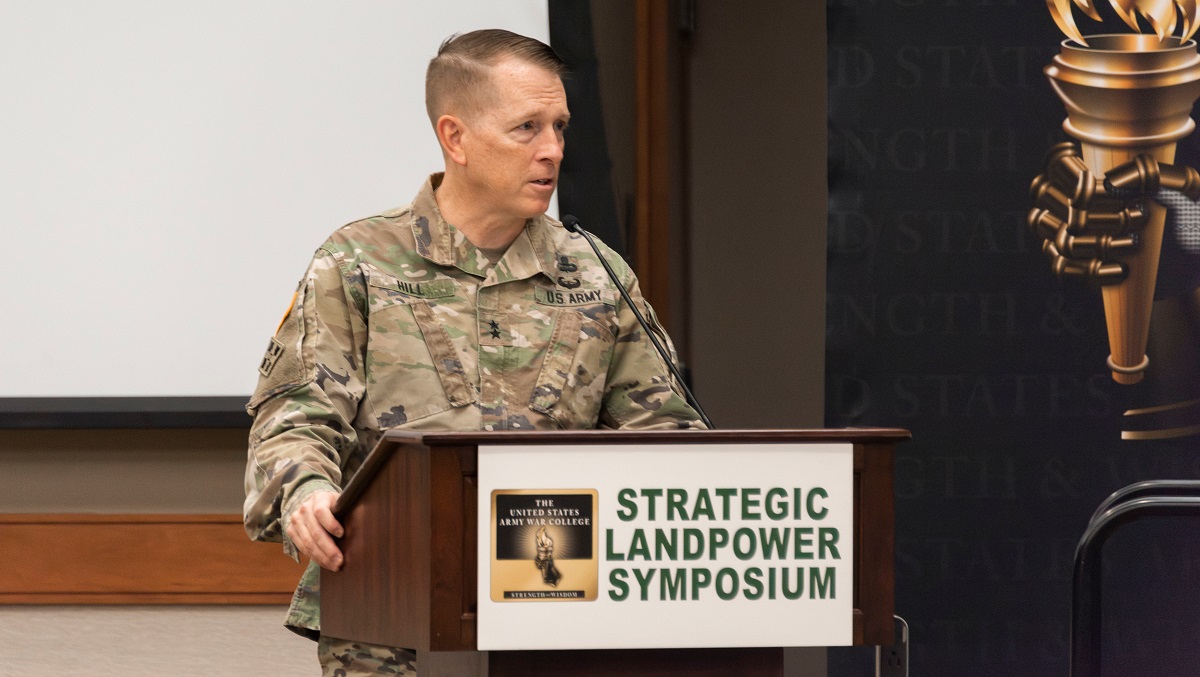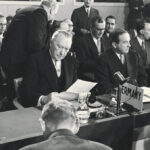
Editor-in-Chief JP Clark had the opportunity to sit down for a conversation with Major General David Hill, the 53rd Commandant of the U.S. Army War College. Their discussion begins with the best-known activity at Carlisle, the education of strategic-minded, joint-qualified warfighters from across the Department of Defense, U.S. Government, and international fellows. But the commandant also comments on the many other activities conducted by Army War College, including executive education for general officers and sergeants major, extensive research in all aspects of national security, and world-class wargaming. There is even the preservation of one of the best collections of artifacts and documents relating to the history of the U.S. Army.
I think the U.S. Army War College almost has an instinctual reaction for people to think almost exclusively about what has been the traditional senior service college experience. But this is a small organization, but with broad reach, that really does help us be experts at advancing knowledge in the global application of land power and in connecting partners and the public with the United States Army War College and the United States Army.
Podcast: Download
Subscribe: Apple Podcasts | Spotify | Amazon Music | Android | Pandora | iHeartRadio | Blubrry | Podchaser | Podcast Index | TuneIn | Deezer | Youtube Music | RSS | Subscribe to A Better Peace: The War Room Podcast
Major General David C. Hill serves as the 53rd Commandant of the U.S. Army War College. In his immediate prior assignment, he served as the Deputy Commanding General, United States Army Corps of Engineers. MG Hill holds a Master of Science degree in Engineering Management from the University of Missouri-Rolla and a Master of Science degree in National Security Strategy from the National War College. He received his commission in 1990 from the United States Military Academy at West Point, New York, graduating with a Bachelor of Science degree in Chemistry.
JP Clark is an associate professor of military strategy teaching in the Basic Strategic Art Program. He served in the army for twenty-six years as an armor officer and strategist. He holds a Ph.D. and M.A. in history from Duke University, an M.S.S. from the Army War College, and a B.S. in Russian and German from West Point. He is the author of Preparing for War: The Emergence of the Modern U.S. Army, 1815-1917 (Harvard, 2017). He is currently working on a history of U.S. military strategy in the Pacific from 1898 to 1941 that is under contract with the University Press of Kansas. He is the 3rd Editor-in-Chief of War Room.
The views expressed in this presentation are those of the speakers and do not necessarily reflect those of the U.S. Army War College, U.S. Army, or Department of Defense.
Photo Description: MG David Hill addresses the Army War College Landpower Symposium, held from May 9 to 11 at the Army Heritage and Education Center. The event brought together military leaders, experts, and scholars to discuss key issues shaping the future of landpower.
Photo Credit: U.S. Army War College





a number of years ago [ perhaps 16 ] I was invited to attend the national security seminar. I was not career army, rather a business executive; however I did serve 31/2 years of active duty….basic, AIT, and engineering OCS. After commissioning, I was stationed at a joint hq in NY and then to Saigon Support Command in Viet Nam. Having been active in politics for many years and a candidate for senate in 1996, I am convinced that my attendance at the Seminar was a critical event in my continuing education. Among other things it showed me what an extraordinary group of individuals make up the American Armed services. I don’t know the current status of the national security seminar but if it is no longer a part of the war college, then that is a terrible mistake. It is important that non professional soldiers be introduced to and get to know the quality of the leadership in the military. During recent political situations, it is the professional military leaders who have been the safe guard against the profound ignorance of so many elected officials. The integrity and intelligence demonstrated by the men and women of the professional military should give all of us a sense of security that otherwise doesn’t exist. thank you War College
Regarding the U.S. Army War College’s curriculum, are there classes being taught to our students today, which explain why both individuals and groups throughout the world now (and even here in the U.S./the West) — as well as various states and societies throughout the world also — are, today, (a) moving away from such things as capitalism, markets and trade and (b) moving away from such things as democracy?
In this regard, does the U.S. Army War College teach that the reason for this such flight from capitalism, markets, trade and democracy, this is due to the “revolutionary” political, economic, social and value “change” demands of (U.S./Western-sponsored) capitalism, markets, trade and democracy today; “revolutionary change” demands which threaten those who (both here at home in the U.S./the West and there abroad elsewhere) depend on the status quo for their power, influence, control, status, privilege, safety, security, etc.?
Given that (historically?) U.S./Western military forces have been used — both here at home in the U.S./the West and there abroad/elsewhere in times like these — this, to deal with those who (a) reject capitalism, markets, trade and/or democracy and/or who (b) reject the “revolutionary changes”/the “reforms” required by same — given this such knowledge (and historical precedent?), should not instruction at the U.S. Army War College — relating to the matters that I present above — be a normal/a standard part of the curriculum?
In classes that I suggest above, would it not be important to point out that (a) one of the reasons why individuals, groups, states and societies are moving away from capitalism, markets, trade and/or democracy today (and, more specifically, the revolutionary political, economic, social and value change demands of same), this is because (b) contemporary great powers, such as Russia and China today, offer an — exceptionally attractive in this context — “you do not need to change to be with us”/”if you go with us, you can actually throw off unwanted change” alternative?
Sou uma senhora de 66 anos, Advogada, sou aposentada e viuva, adoro ler e principalmente admiro a tragetória de vida de pessoas que compõem a história de uma Instituição de imensso destaque no cenário mundial.
Pessoas como o M. General David C. Hill, que dedicam a maior parte de suas vidas ao contribuir com uma Classe do tamanho do Exercito dos EUA.
Sabendo que são pessoas que além do Posto que ocupam tem uma familia, uma vida pessoal que ultrapassa as fileiras militares.
Desejo parabenizá-lo por sua realização profissional que com certeza irá servir como exemplo a muitos jovens. Gratidão Major General David C. Hill